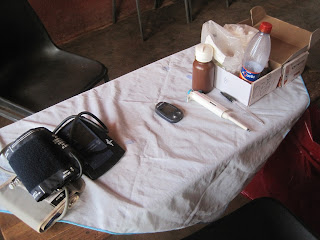Swaziland has 2 main cities, Manzini and Mbabane. The rest of the country is mainly rural. Imagine living in the homesteads on the hills of the mountains, far from cities, with the only means of transportation being your calloused feet. This is why community health facilities have a crucial role in the lives of swazis, especially among vulnerable groups, such as children and elderly.
The Luke Commission, the only mobile hospital of Swaziland, has operated since 2005 under the direction of Dr. Harry and Echo (PAC) VanderWal, taking free health care and the good news of Jesus Christ to the most isolated and underserved populations, in partnership with the Swazi people and the Ministry of Health.
At 6 am several times a week, big kombis and trailers, in total of almost 20 Americans and 15 Swazi translator-assistants leave base camp in Manzini, head to remote areas and start up a 9 room hospital normally at schools. Communities with hundreds of patients are welcomed and team explains how the clinic will operate and that everything is free. Blood pressure and sugar level are determinated for each patient. Each patient is treated by a doctor or a physician assistant. Patient are given medications, purchased in Swaziland, verbally instructed how to use medication and written directions in SiSwati printed on each medication packet. Each patient receives a one-month supply of vitamins, extra pain-relief medicine, and intestinal worm medication for every member of the family. Voluntary HIV testing and counseling is offered to everyone at the mobile clinics. During 1 day up to around 40 male circumcisions are also operated along with sexual education and counceling. The Luke Commission even has x-ray and laboratorio. The day is in the end only when the last patient is checked and treated, which is around the midnight.
The Luke Commission, the only mobile hospital of Swaziland, has operated since 2005 under the direction of Dr. Harry and Echo (PAC) VanderWal, taking free health care and the good news of Jesus Christ to the most isolated and underserved populations, in partnership with the Swazi people and the Ministry of Health.
At 6 am several times a week, big kombis and trailers, in total of almost 20 Americans and 15 Swazi translator-assistants leave base camp in Manzini, head to remote areas and start up a 9 room hospital normally at schools. Communities with hundreds of patients are welcomed and team explains how the clinic will operate and that everything is free. Blood pressure and sugar level are determinated for each patient. Each patient is treated by a doctor or a physician assistant. Patient are given medications, purchased in Swaziland, verbally instructed how to use medication and written directions in SiSwati printed on each medication packet. Each patient receives a one-month supply of vitamins, extra pain-relief medicine, and intestinal worm medication for every member of the family. Voluntary HIV testing and counseling is offered to everyone at the mobile clinics. During 1 day up to around 40 male circumcisions are also operated along with sexual education and counceling. The Luke Commission even has x-ray and laboratorio. The day is in the end only when the last patient is checked and treated, which is around the midnight.
Those with
eye problems are tested with a portable auto refractor and computer program
specifically designed for these bush clinics, appropriate eyeglasses dispensed
from the database of 3500 donated eyeglasses and, if necessary, scheduled for free
cataract surgery. PET bush wheelchair are provided for those with
mobility limitations. Often, new clothes or shoes are given to AIDS orphans and
the children. Activities are conducted for the children since it is a long day
to spend waiting.
Bibles and
Scripture booklets were distributed with the goal of putting one Bible into
every Swazi homestead. Only since 1996, has the Bible been translated in
SiSwati and often Zulu translation is used. Prayer is provided for every
patient. If patients so choose, they can watch a movie depicting the life of
Jesus while the clinic activities continue.
The Luke Commission is a highly-trained and hard working team, treating more than 25 000 patients a year. To learn more please visit their website http://www.lukecommission.org/ and watch their video:




Ei kommentteja:
Lähetä kommentti